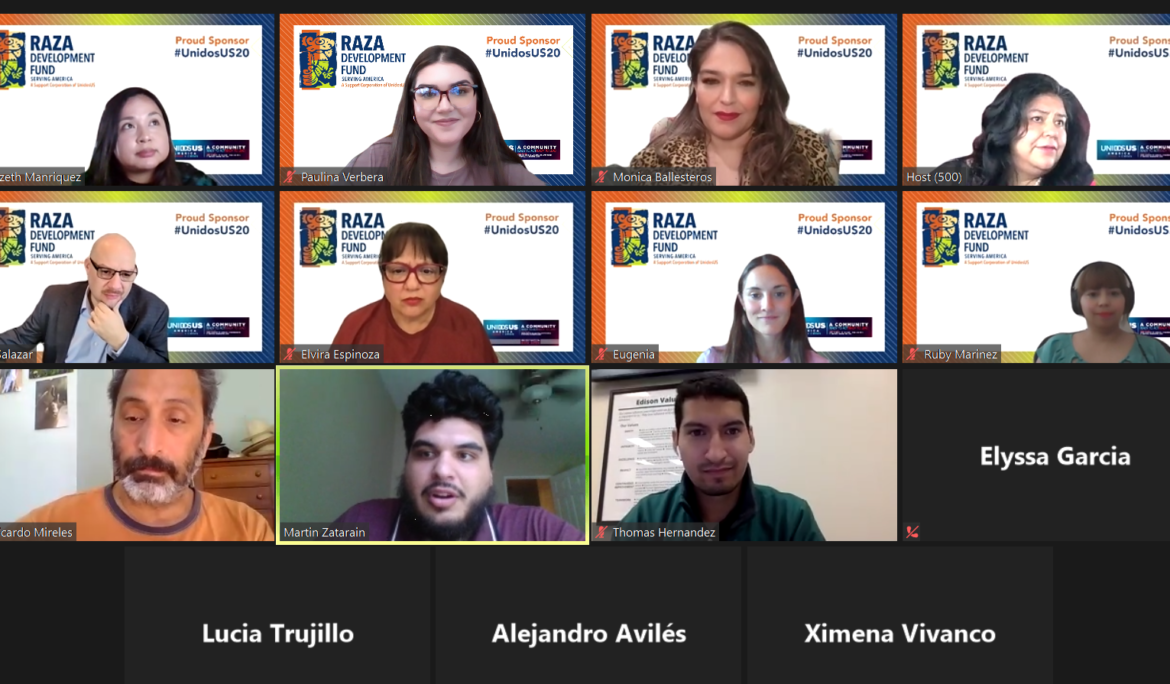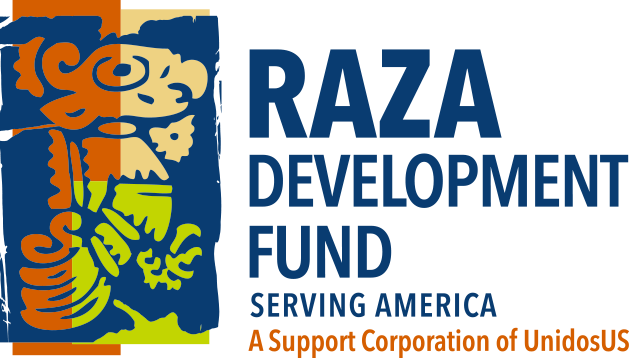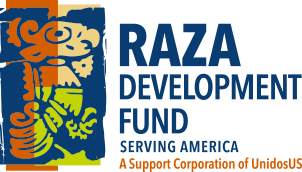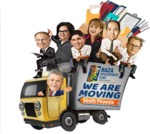A Virtual UnidosUS Conference From the Eyes of An RDF Intern

The UnidosUS Annual Conference gives participants from all over the U.S. a meeting ground to discuss and focus on topics that address pressing issues that Latinos face daily. This year was unique—they went to a virtual format, keeping everyone safe, without losing momentum and still moving the agenda of the Latino community forward.
We had the opportunity to hear from prominent leaders about a variety of key topics like the importance of health insurance, phenomenal Latinas, and voting. For me, it was empowering to learn about current events and problems that are affecting many people.
The virtual conference was held over four days, and I will recap my favorite moments of each day. One benefit of going virtual is that it’s not too late to be part of the fun. If after reading my blog post you want to be part of the conversation, you can go back and watch the Replay on the UnidosUS website.
Day 1
A Big, Bold Recovery: Senator Elizabeth Warren & Dr. Manuel Pastor
Dr. Manuel Pastor, a Distinguished Professor of Sociology and American Studies & Ethnicity at the University of Southern California, kicked off the first day of the conference as he moderated a conversation with Senator Elizabeth Warren. Elizabeth Warren is a former law professor serving as the senior United States Senator from Massachusetts.
“US-born Latinos, who need better jobs and education, what kind of program do you think is important in particular for the US-born Latinos to be able to make those economic advances?” asked Dr. Manuel Pastor.
“We have to make this country work for everyone. The economy that I want to see in America is one where we make our investments with our babies. We invest in early childhood education. We put real money into childcare,” answered Elizabeth Warren.
As a high school student that attends public school, seeing how child education is underfunded, is a day-to-day occurrence for me—starting from only getting a tissue box once per year to having to learn from old textbooks.
Schools should get more money for their students. I cannot imagine how all public schools are going to get the money to be adequately equipped with the right necessities to prevent COVID-19 from spreading. Schools should be funded for all students to receive a proper education. 90% of jobs in the U.S. need high school education, so we should prioritize that everyone achieves a high school certificate. Education is the future.
Our Health on the Line: Dr. Leana Wen, Dr. Barbara Ferrer & Julio Vaqueiro
Julio Vaqueiro, Anchor for Noticias Telemundo Fin de Semana, moderated a panel with Dr. Leana Wen, Professor of Health Policy and Management from George Washington University School of Public Health, alongside Dr. Barbara Ferrer, Director of Public Health at the Los Angeles County Department of Public Health. Julio started the conversation by touching on the topic that we are all living through—this pandemic.
“Why is it so important in a situation like this, in the middle of a pandemic to have good health insurance and to lower the out of pocket cost?”, asked Julio Vaqueiro.
“If someone is ill, we need for them to seek help without fear of them going bankrupt. If they end up being sick and they are afraid to seek help for fear of bankruptcy or of immigration enforcement, they are going to stay home and potentially infect other people… people should not be priced out of the ability to get their basic needs attended to,” replied Dr. Wen.
How is it possible to have the COVID-19 test cost up to $506 to $4985 out-of-pocket for a patient in New York, a place that is home to many COVID-19 cases? How are people with bad or no health insurance going to pay to get checked if they could potentially have COVID? I feel so blessed to live in a state like Arizona that offers testing for free in some areas.
My dad is an essential care worker, and I am glad he gets the opportunity to check if he is healthy without causing a giant hole in our pocket due to medical expenses. Having the pandemic be present is an eyeopener for many things, but one main thing is that everyone should have access to affordable healthcare.
No one should have to die because they do not have enough money to pay for an emergency visit. It is an oppressive reality that many Latinos and low-income families have to face.
Day 2
Phenomenal Latinas: Cristela Alonzo, Alicia Menendez, Cecilia Muñoz & Lulu Garcia Navarro
During this presentation, I saw myself in these women because just like them I had the opportunity to learn about things alongside my parents—and knowing that makes me value them even more.
I identify as a child of immigrants. We have to learn new skills in a new country quickly many times at the same time as our parents. Knowing that they approached many things alone and still achieved what we have is impressive. When my parents share stories about how difficult it was immigrating to this country, my jaw never fails to hit the floor.
“So many kids of immigrants end up having to guide our parents into this country,” said Cristela Alonzo, as she shared about her immigrant experience. Cristela is a comedian, actress and producer, and she is the first Latina to create, produce and star in her own network sitcom.
Lulu Garcia Navarro, host of NPR Weekend Edition, moderated this conversation. She began talking about the importance of role models to young people like me.
“If you had a little bit of advice to your younger self, what would that be?” asked Lulu Garcia Navarro.
“The virtue of you being a Latina and being a daughter of immigrants, you bring something into the room that the people in the room need, they may not know that they need it but they do. And if you could walk into the room with the confidence of understanding that they need what you bring, then you are going to be able to bring it,” Cecilia Muñoz answered.
Cecilia is the Vice President of Public Interest Technology and Local Initiatives for New America, a think-tank in Washington, DC. She also a high-ranking official in the Obama administration, serving as the first Latina to lead the White House Domestic Policy Council.
I connect with this because I am a daughter to immigrants, supportive parents. Growing up I lacked confidence, but through family conversations, my parents told me something similar to Muñoz’s quote. All Latinas have something to bring to the room, everyone does. We need the confidence to show it.
¡Adelante! Progressive Power in the 2020 Elections: Ruben Gallego, Clarissa Martinez, Eliazar Posada, Angelica Razo & Paola Ramos
It was refreshing to learn about various strategies community organizations are implementing to get citizens registered to vote in this session. Several Latinos or new voters do not even know how to get started on registering to vote.
Minors like myself cannot vote yet, but it is imperative to have knowledge about voting, so when our time comes to vote, we are ready to exercise that right.
Paola Ramos, a Latinx advocate, moderated the conversation with elected officials as well as community and organization leaders from across the country.
“How do we best educate our community in terms of the best and the safest ways to vote right now?” she asked.
“We have been working with some of our community leaders to create some videos to share with folks. In our websites, social media we put out commonly asked questions,” answered Eliazar Posada, director of community engagement and advocacy at El Centro Hispano, an UnidosUS affiliate organization.
“There is mail voting, early voting, this is how you get these forms, and this is how it works. We know that some folks don’t have the time to go to websites and read long articles. So one-minute videos with the information they need.”
“Having more young people present in this space with us has been great because people who would’ve previously said oh I am a tech person, politics aren’t for me. They are finding a great role in this,” added Angelica Razo, Texas State Director for Mi Familia Vota.
These new digital strategies are an excellent opportunity to get more people involved in the voting process. Especially people who like technology– by using their talents to create new ways to reach people everywhere to make it accessible for people to vote from home.
Day 3
Elevating Latino Voices in D&I: Maria G. Arias, Cid Wilson, Kevin Frazier, Patty Juarez, Merary Simeon
Janet Murguia, president and CEO of UnidosUS, shared some opening remarks to this session that opened up the topic of diversity and inclusion.
“UnidosUS is all about creating opportunities for Latinos to thrive, UPS and our partners also believe in opening up an opportunity for those who have historically been left out,” said Janet Murguia.
Then, the conversation began and the session’s moderator opened up the first topic for discussion as a part of the conference’s corporate experience.
“Cid, as the president of HACR, can you talk to us a little bit about the representation of Latinos on corporate boards and what HACR is working on to ensure that it increases over time?” asked Maria G. Arias, an UnidosUS board member.
“If I were to talk to a corporation, and I told them that if they invest in a country that was eighth largest economy in the world, that was dollar-denominated, that was in a strong regulatory environment, that is growing faster than most developed countries, that is tripled A-rated, and is English dominant. Would you invest in a country like that? They would say, of course, well I just described to you the US Latino community,” responded Cid Wilson, “that is our global power, and yet despite that, a little over 3% of 40,500 chair seats are held by Latinos and 1% are held by Latinas.”
HACR is the Hispanic Association on Corporate Responsibility and has the mission to ensure that Hispanics are represented in corporate America as much as their contributions in our economic society.
Unfortunately, the Latino community is underrepresented in the number of chair seats in high power positions. There should be more Latinos and Latinas in these decision-making positions, creating opportunities for others like them.
I am delighted to be part, as an intern, of a corporation like RDF that encourages Latinos with high goals and dreams. From this conference, I learned that other corporations are also working on creating a change in these statistics.
A clear example of Latinos being able to reach their goals is Mr. Tommy Espinoza, Chief Executive Officer and Elvira Espinoza Chief Communications Officer at RDF. Elvira Espinoza has made a huge impact in the Latino community both in her current role and as a journalist. Elvira Espinoza is the only Latina journalist to be inducted into the Arizona Newspapers Association’s Hall of Fame.
Day 4
Reopening in a Pandemic: Aida Cardenas, Monique Baptiste, Christine Calandros & Monique Lovato
In this final session, I enjoyed learning from these expert women about the different parts of our lives that will change after living through this pandemic.
The moderator for this session’s panel discussion was Aida Cardenas, UnidosUS board member and the Deputy Director of Equity, Climate and Jobs at the California Workforce Development Board. She touched on the issue of the digital divide.
She welcomed Monique Lovato, CEO of Mi Casa Resource Center in Denver, and asked her to share some of the findings they gained from research they conducted about COVID-19 and its impact on the Latino community.
“15% of the small businesses that we were working with were shuddering. Our job seekers were furloughed, some of them were laid off. Believe it or not, some of them were still working but their hours were cut. Now we know at a national level, and another thing is they were having a harder time accessing support programs,” shared Monique Lovato, “some of our participants had a difficult time connecting to the internet. They didn’t always have devices, consistent connectivity.”
As a young teen, naively, I thought that everyone had access to WiFi and a computer in the U.S. During this crisis, I learned to my surprise that there is a huge chunk of people who do not have access to WiFi for school or work. Learning of the negative impact of this pandemic on small communities hits the spot in my heart.
What hurts even more, is that many people have a disadvantage when it comes to having access to the internet for school. This is vital, especially with a pandemic going on, and people staying home. What I have noticed is that these small communities do not give up and strive to get back on their feet again, and that is inspiring. It is encouraging to see how many people rise after they go through immense obstacles, something we as Latinos know how to do well.
Watching these meetings has given me new insight into the way I look at things. I have never felt so proud to be a Latina, and listening and watching to these powerful people talk about our culture and how strong Latinx and business owners can be, make me feel joyful.
Every day I looked forward to listening to new ideas and thoughts that different inspiring people had to say. Although I did not talk about every conference, I highlighted the ones that spoke out to me. Hopefully, it will give you the flame to achieve your goals and dreams and support those of your communities. I know it has ignited my flame to realize mine.




